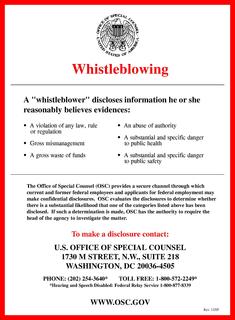 W
WThe All Circuit Review Extension Act is an Act that extended for three years the authority for federal employees who appeal a judgment of the Merit Systems Protection Board (MSPB) to file their appeal at any federal court, instead of only the U.S. Court of Appeals. This was a pilot program established in the Whistleblower Protection Enhancement Act of 2012 to last only two years.
 W
WThe Civil Service Reform Act of 1978, (CSRA), reformed the civil service of the United States federal government, partly in response to the Watergate scandal. The Act abolished the U.S. Civil Service Commission and distributed its functions primarily among three new agencies: the Office of Personnel Management (OPM), the Merit Systems Protection Board (MSPB), and the Federal Labor Relations Authority (FLRA).
 W
WThe Criminal Antitrust Anti-Retaliation Act of 2013 is a bill that would protect whistleblowers who report violations of United States antitrust law. The bill would have whistleblowers first file a retaliation claim with the United States Department of Labor before going to federal court. The bill passed the United States Senate during the 113th United States Congress.
 W
WThe Department of Defense Whistleblower Program in the United States is a whistleblower protection program within the U.S. Department of Defense (DoD) whereby DoD personnel are trained on whistleblower rights. The Inspector General's commitment fulfills, in part, the federal mandate to protect whistleblowers. It also administers the Defense Intelligence Community Whistleblower Protection Program (DICWP), as a sub-mission for the intelligence community. The Inspector General's Defense Criminal Investigative Service also conducts criminal investigations which rely, in part, on Qui Tam relators.
 W
WThe Federal Mine Safety and Health Act of 1977 amended the Coal Mine Safety and Health Act of 1969. It can be found in the United States Code under Title 30, Mineral Lands and Mining, Chapter 22, Mine Safety and Health.
 W
WThe Notification and Federal Employee Antidiscrimination and Retaliation Act of 2002 is a United States federal law that seeks to discourage federal managers and supervisors from engaging in unlawful discrimination and retaliation. It is popularly called the No-FEAR Act, and is also known as Public Law 107–174.
 W
WThe Protected Disclosures Act 2000 is a piece of New Zealand legislation regarding the disclosures, in the public interest, of serious wrongdoing. The Act promotes the public interest by setting out procedures to be followed when making a disclosure, and provides protection to employees who make disclosures, in accordance with the Act.
 W
WThe Resource Conservation and Recovery Act (RCRA), enacted in 1976, is the principal federal law in the United States governing the disposal of solid waste and hazardous waste.
 W
WA whistleblower is a person who exposes any kind of information or activity that is deemed illegal, unethical, or not correct within an organization that is either private or public. The Whistleblower Protection Act was made into federal law in the United States in 1989.
 W
WThe Whistleblower Protection Act of 1989, 5 U.S.C. 2302(b)(8)-(9), Pub.L. 101-12 as amended, is a United States federal law that protects federal whistleblowers who work for the government and report the possible existence of an activity constituting a violation of law, rules, or regulations, or mismanagement, gross waste of funds, abuse of authority or a substantial and specific danger to public health and safety. A federal agency violates the Whistleblower Protection Act if agency authorities take retaliatory personnel action against any employee or applicant because of disclosure of information by that employee or applicant.